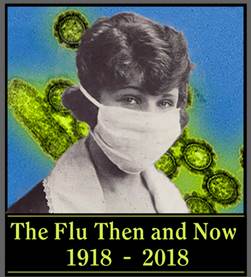Library News
Thesis Research 101 workshops offered
Posted on September 28th, 2018
Booth Library faculty Steve Brantley, Kirstin Duffin and Ellen Corrigan, in cooperation with the Graduate Student Advisory Council, will again offer three Thesis Research 101 workshops.
Thesis 101 Seminar 1: Researching the Literature with Steve Brantley will be offered from 6-7 p.m. Oct. 30 and again from 10-11 a.m. Nov. 1 in Room 4450 of the library.
Thesis 101 Seminar 2: Organizing Your References with Kirstin Duffin will be offered from 6-7 p.m. Nov. 6 and again from 10-11 a.m. Nov. 8 in Room 4450 of the library.
Thesis 101 Seminar 3: Preparing Your Thesis with Ellen Corrigan will be offered from 6-7 p.m. Nov. 13 and again from 10-11 a.m. Nov. 15 in Witters Conference Room 4440 of the library.
Register for the free seminars here.
For more information contact Steve Brantley, head of Reference Services, at 581-7542 or jsbrantley@eiu.edu.
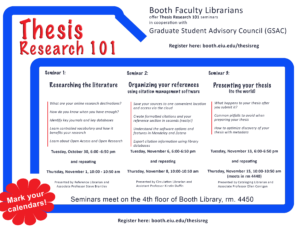
Stargazing
Posted on September 27th, 2018
Several Astronomy and Stargazing titles available at Booth for clear nights!
Free trial of Scopus through Oct. 12
Posted on September 17th, 2018
Scopus contains abstracts and citations for peer-reviewed literature in the sciences, technology, medicine, social sciences, and arts and humanities. The database lets users track, analyze and visualize scholarly research. It provides access to more than 71 million records from 22,000 titles, 5,000 publishers and 3800 open-access journals.
Users can search by title, abstract, source, keyword, etc., as well as by author and affiliation. For example, choose Authors from the main menu, then type in an author’s name to find citations for articles written by that author and a list of other documents that cite that author’s research.
Please try it out and let us know what you think! Our trial access extends through October 12. For more information or to provide feedback, please contact your subject librarian or call the library reference desk at 581-6072.
Novels set during the 1918 influenza epidemic
Posted on September 13th, 2018
For readers interested in experiencing what life was like a century ago, as the 1918 influenza epidemic swept through the country, below are some works of fiction that are owned by Booth Library. These novels will take you back in time to reveal stories of family, survival, and personal strength.
This list is offered in conjunction with the fall 2018 Booth Library exhibit “The Flu Then and Now: 1918 to 2018.” Read more about each book, and check its status on the shelf, through the links below.
In Philadelphia in 1918, the lives of the Bright family change dramatically when the flu arrives on their doorstep.
A suspenseful murder mystery set in New York City, as the “Spanish flu” spreads through the city’s population, but were some suspicious deaths caused by the flu, or something else?
Lehane’s epic of the tumultuous post-World War I period in Boston includes significant events of the era, including the influenza epidemic.
The heroine of this quirky historical fantasy novel is a young Italian immigrant with magical abilities who loses her parents to the influenza epidemic and takes control of her life in a unique way.
After returning to the world following a bout with the “Spanish Flu,” Ivy Rowan discovers she can see ghosts of those who died.
At the time of the influenza epidemic in Boston in 1918, a female entrepreneur tries to ensure her future.
Free trial available for HeinOnline!
Posted on September 12th, 2018
HeinOnline’s Government, Politics, and Law is a collection of databases comprised of more than 50 million pages of content, covering political science, criminal justice, world history, civil and human rights, and more. It provides access to more than 300 years of information, covering political development and the complete history of the creation of government and legal systems around the world.
Databases include the following:
- U.S. Congressional Documents
- Foreign Relations of the United States
- World Constitutions Illustrated
- Religion & the Law
- United States Code
- Law Journal Library
- History of International Law
- Treaties and Agreements
- Legal Classics
- U.S. Supreme Court Library
Please try it out and let us know what you think! Our trial access extends through March 15, 2019. For more information or to provide feedback, please contact your subject librarian or call the library reference desk at 581-6072.
Fall Book Sale is Sept. 19
Posted on September 11th, 2018
Booth Library will host its fall book sale from 9 a.m. to 4 p.m. Sept. 19 outside the south entrance of the library.
A large selection of books in all subject areas, including a wide variety of art books; hundreds of paperback fiction titles; LPs; and more will be available for purchase.
The proceeds from the sale are used to enhance library programs and services.
In case of inclement weather, the sale will be postponed. For the latest information on scheduling, check the library website, www.library.eiu.edu, or find Booth Library on Facebook or Twitter.
Exhibit examines 1918 flu pandemic and flu prevention today
Posted on September 6th, 2018
“The Flu Then and Now: 1918 to 2018,” an exhibit commemorating the 100th anniversary of the 1918 flu pandemic, will be on display at Booth Library from Sept. 13 through Dec. 27, 2018.
In 1918, an estimated 500 million people (one-third of the world’s population) were infected with the H1N1 flu virus, and at least 50 million died. This exhibit and related programs take a closer look at this historic flu pandemic and how the flu affected life at EIU and in Charleston, both in 1918 and today.
This series provides historical information on the 1918 influenza pandemic as well as providing a current public health perspective on influenza. Topics of contagion, vaccination and infection will be covered from a historical, medical and social perspective. Coverage of the flu epidemic in the press will be explored. Local public health experts will cover measures taken to control future epidemics.
Following is a complete schedule of programming related to the exhibit:
Opening program: Sept. 13, 7 p.m., “1918 Influenza: Impact, Implications and Uncertainty,” by Sheila Simons, professor of health promotion; library West Reading Room.
Oct. 1, 4 p.m., “Influenza and Infection Prevention – Can you say FLU, SARS, MERS CoV?” by Ramona Tomshack, RN, infection preventionist, Sarah Bush Lincoln Health Center; library Witters Conference Room 4440.
Oct. 9 and Oct. 11, 11:30 a.m.-1 p.m., 1918 menu at The Café, led by Richard Wilkinson, professor; 1414 Klehm Hall; $6.
Oct. 16, 4 p.m., “The Importance of Vaccinating for the Flu … Vaccinate Your Crew,” by Michele Hartke, nurse practitioner, Health Education Resource Center; library Witters Conference Room 4440.
Oct. 23, 10 a.m.-4 p.m., flu shot clinic for EIU students, faculty and staff, Martin Luther King Jr. University Union.
Nov. 7, 3 p.m., film screening and discussion: “1918” (Foote, 1985), discussion led by Lynne Curry, professor of history; library Witters Conference Room 4440.
Nov. 14, 3-4:15 p.m., poster presentations by History 4950 students of Professor Lynne Curry, library West Reading Room.
Nov. 27, 4 p.m. (RESCHEDULED from Oct. 30) “Immunity and Contagion: Living in the Age of Bio-politics,” by C.C. Wharram, professor and director of Center for the Humanities; library Witters Conference Room 4440.
All programs are free unless otherwise noted, and the public is invited. “The Flu Then and Now: 1918 to 2018” exhibit can be viewed anytime the library is open. For more information, visit http://booth.eiu.edu/flu.
Explore a Database: MLA International Bibliography
Posted on September 5th, 2018
Welcome back! This week we explore MLA International Bibliography, an EBSCO database and available to anyone with an EIU login.

Produced by the Modern Language Association, MLA is a go-to resource for scholarship in the Humanities, especially language, literature, rhetoric, composition, folklore and film.
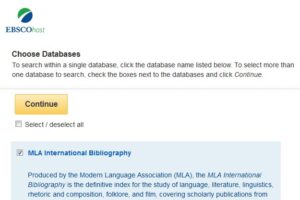
In order to access the MLA database, you’ll first be taken to a portal on EBSCO’s site. Just select the yellow ‘Continue’ box and you’ll be taken straightaway to the MLA International Bibliography.
Like many of the databases hosted by EBSCO, MLA International Bibliography provides you with many different ways to find scholarly article sources by refining and narrowing different search criteria. And while this may seem a little intimidating, by narrowing down your search results, you’ll find exactly what you’re looking for in less time than it takes to browse through the thousands of article citations that you retrieve with keyword searches.
Just like our look at Academic Search Complete, this blog will focus on how to find materials, instead of some of the interesting things you might find on out databases (although, there are many wonderful and fascinating finds in MLA International Bibliography, too!)

Like Academic Search Complete and other databases hosted by EBSCO, everything starts with the three search boxes at the top of the screen. Here, you can find a starting point for those sources you’re looking for by entering in the subject, the author’s name, or even keywords that appear in the text. Anything you’re looking for you’re bound to find!
The heading under the three search boxes, ‘Search Options,’ allows you to start digging for specific texts by offering a ton of different options for you to narrow the information in those top three search boxes.
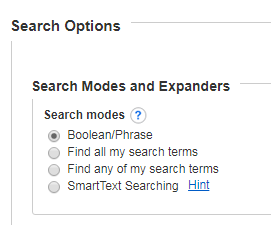
The first subheading, ‘Search modes and expanders,’ lets you specifically narrow the information. Options like ‘Find all my search terms’ lets MLA International Bibliography find ALL your search terms as they appear in article. So, if an article appears after you select this option, it will have not one, not two, but all of the terms you’re looking for in its list of articles.
The ‘Find any of my search terms’ option allows for a broader search. By selecting this option, you’ll find texts with any of your searched terms. Options like ‘Apply related words’ and ‘Apply equivalent subjects’ will broader your search also, as well as look for search terms related to the ones you entered, but maybe didn’t think about. How cool is that?
The subheading ‘Limit your results’ is where you can find really interesting results. Because there are so many options under this subheading, we’ll be dividing options right down the middle as they appear either on the left side or the right side.
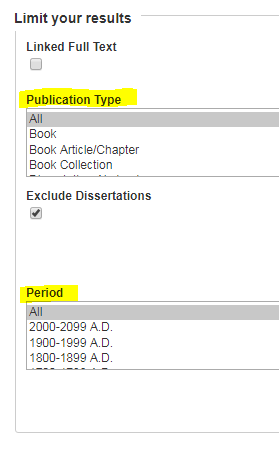
On the left side, options like ‘Publication type’ let’s you find the type of document you’re looking for. In the scroll-down menu you can select books, book chapters, journal articles, websites, and many other forms of text. Also on the left side, you can select the time period what your text was written about. In the scroll-down menu under ‘Period,’ you can find writings about any time period between B.C to 2099.
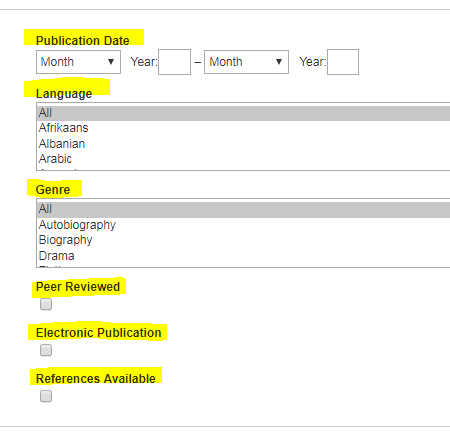
On the right side you can narrow down your search terms by publication dates, the language it was written in, and many more. Also on the right side you can search for the genre you want your sources to be from. Options such as short story, biography, letters, saga, and anything you can think of make their home in the scroll-down menu under ‘Genre.’ The right side also has options to find texts that are peer reviewed, electronically published, or that have references available. All you need to do is tick the appropriate box and those materials are literally at your fingertips!
I know, it’s a lot to take in! These options may seem a little overwhelming at first, but once you have them down, you’ll never spend another all-nighter looking for those required sources again. You can always ask the librarian for help on any of these strategies and features.



